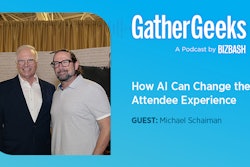
 Jon EichorstPhoto: Courtesy of Wilson Dow Group
Jon EichorstPhoto: Courtesy of Wilson Dow Group
It's no secret the event industry was disrupted over the past five years. In an ever-evolving event landscape, being at the forefront of change—and more specifically, what success looks like to attendees moving forward—is more important now than ever before. What we have validated in recent attendee data studies is clear: People want real, human connections.
They want to be inspired by everything you can't get on a screen, including human-to-human discussion, participatory content, and a sense of discovery at every turn. So, as we turn to AI as a helpful tool to create more face-to-face interactions, it sounds almost like a sci-fi plot twist. We craved human connection, yet now we're asking AI to help us achieve that?
The truth is AI can only help achieve our desired outcomes with the application of human guidance and oversight. Let's dive into the paradox in which AI empowers event professionals to understand and interpret feedback from attendees, making the guest experience more profound and meaningful.
'Their' Data, 'Their' Design
Whether harnessing predictive AI, generative AI, or a combination of both, actualizing intention is a path to delivering enhanced and elevated experiential outcomes that have amplified personalization like never before.
By utilizing AI capabilities in event technology solutions and digital experiences, organizers can ask in-the-moment questions; get real-time, actionable feedback; and better understand attendees' sentiments. Gone are the days of merely using post-event feedback surveys to discern audience insights. We don't have to wait to know if something is resonating. We can now learn how attendees feel and leverage AI to interpret responses, make in-the-moment changes, and provide recommendations to help guide the attendee's journey.
This is also valuable for attendees in that their feedback can help connect them to like-minded individuals and craft a more rewarding networking experience, leaving less to chance. Attendees sharing their ongoing experiences also help organizers create a more personal and intentional outcome, creating an exciting experience, with continuous and evolving recommendations as AI "gets to know" each guest better.
Enhancing the Value Proposition
Outside of networking, keynotes, and breakout sessions, event activations utilizing AI can also be a beacon of personalization and connectivity. Going beyond the typical and expected photo booth, building intentional activations related to the event goals is essential. With AI, we can make these activations more individualized and tangible, as informed by real-time attendee feedback.
For example, imagine the concept of an interactive activation to mirror the innovation of a new tech product at a launch event in which AI generates a customized deliverable specific to the attendees via a series of simple prompts. This deliverable can be shared publicly across an event app and a digital social wall to break the ice as a conversation starter, thereby increasing engagement and connectivity among attendees.
AI can also generate personal greetings and responses throughout the attendee journey, from welcoming guests at registration to post-event communications, making each moment truly resonate as a touchpoint that is unique to them. Ultimately, AI should enhance value for the attendee and help facilitate a deeper connection between the event and their learning outcomes.
The New Beginning Point to Planning
The landscape can often feel overwhelming, with countless ways to use AI and numerous tools on the market. As a first step, we recommend focusing on the human element. Start by asking: How can AI potentially support achieving or elevating desired business outcomes while enhancing the attendee experience? Then, focus on AI solutions that amplify the event's human aspects.
While AI can provide valuable insights and efficiency, help process feedback, and offer personalization throughout the attendee journey, it is the human touch that brings events to life. When you use AI tools to complement human creativity, not replace it, you can create experiences that foster deeper connections and resonate with more attendees.



















